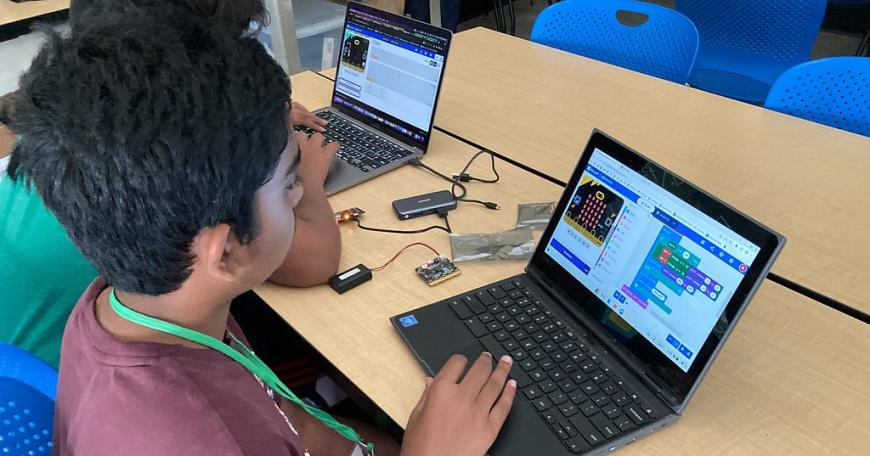
Free MIT resources for pK-12 computer science education and fluency
By Katherine Ouellette
With today’s rapidly-evolving technologies, helping young learners grow their computer science skills and computational fluency is more important than ever. That’s why MIT Open Learning offers free educational resources to learners and educators around the world. This Computer Science Education Week, empower learners with programs, curricula, and activities designed by MIT researchers.
Coding mobile apps
MIT App Inventor enables learners to create their own mobile apps. This intuitive, visual programming environment makes it easy to build fully functional apps for Android phones, iPhones, and Android/iOS tablets. MIT App Inventor seeks to democratize software development by empowering young learners to evolve from technology consumers to technology creators.
Get started: Invite young learners to create a simple app that runs on ChatGPT.
Developing AI skills
Day of AI empowers learners to thrive in an AI-powered world. The open-source AI curricula, activities, and professional development materials offered through this initiative are designed for educators and learners of all backgrounds and abilities. Day of AI aims to prepare young learners to be successful, responsible, and engaged AI users in school and their everyday lives.
Get started: Register to access the Day of AI curriculum.
Empowering climate action
Day of Climate introduces learners to climate research and how it shapes their lives. This curriculum of hands-on activities allows learners to better understand climate change, its impact, and imagine possible solutions. Launching in spring 2025, Day of Climate aims to inspire young learners to design and implement their own solutions for climate and sustainability challenges.
Get started: Show young learners how to explore climate through a data science lens.
Enabling hands-on STEAM education
For classrooms or home
Full STEAM Ahead offers high-quality MIT educational resources both online and through outreach programs. The hands-on activities help young people learn about science, technology, engineering, arts, and math (STEAM) via research-proven methods. Full STEAM Ahead aims to inspire a diverse global community of educators, learners, and parents to leverage innovative learning solutions.
Get started: Foster creative learning by inspiring young people to design their own online math games.
For libraries
The Public Library Innovation Exchange (PLIX) engages young learnersin creative, research-based STEAM activities at public libraries. These library program activities nurture learners as technology designers instead of consumers. PLIX strives to increase equitable access and participation in STEAM programming.
Get started: Help young learners develop their skills in both science and art with this activity that combines coding, storytelling, and creating.
Fostering learning through innovation
The STEAM Learning Architecture is an educational framework for teaching and learning that aims to prepare young people for evolving and emerging careers and technologies. This learner-centered architecture is grounded in three core pillars: social-emotional and cultural learning, transdisciplinary academics, and community engagement. Initially co-created for Itz’at STEAM Academy in Belize, the STEAM learning architecture now serves as a model for schools worldwide.
Get started: Read a Q&A with the creators of the framework to learn why it works and how to adapt it.
Uplifting AI hackathon
FutureMakers engages learners who are underrepresented in STEM fields about AI and computational action in an onlinehackathon experience. The cohort-based program empowers young people to learn about foundational concepts, consider ethical implications, develop technical skills, and bolster their collaborative skills. FutureMakers aims to enrich AI literacy and education among underserved learners.
Get started: Sign up for the MIT RAISE mailing list for updates about next year’s online program.
These resources and programs are available through MIT pK-12 and the RAISE Initiative (Responsible AI for Social Empowerment and Education), which are both part of MIT Open Learning. MIT pK-12 creates meaningful learning experiences for young learners and educators around the world through co-design, capacity building, and impactful work at scale. MIT RAISE Initiative is a collaboration between MIT Open Learning, Media Lab, and Schwarzman College of Computing that helps prepare learners and workers for an AI-powered society.
Free MIT resources for pK-12 computer science education and fluency was originally published in MIT Open Learning on Medium, where people are continuing the conversation by highlighting and responding to this story.

